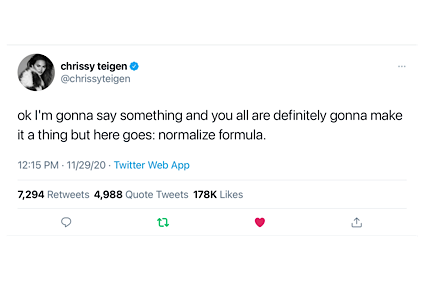
Recently Chrissy Teigen issued a full throated defense of infant formula.
ok I’m gonna say something and you all are definitely gonna make it a thing but here goes: normalize formula.
[N]ormalize breastfeeding is such a huge, wonderful thing. but I absolutely felt way more shame having to use formula because of lack of milk from depression and whatnot…
As for efforts to increase her supply:
Insufficient breastmilk is a disability; refusing to believe it is ableism.
[T]he stress of it, combined with the guilt that you cannot do nature’s most natural thing for your own baby is too much. I dunno why this is my crusade now. I just remember the sadness I felt and want you to know you are doing it right if your baby is fed, mama.
The lactivist response has been predictable and predictably ableist — including the belief that breastfeeding is perfect and the assumption that insufficient breastmilk could have and should have been “fixed.”
What do I mean by ableist? Let’s do a little thought experiment. I’m going to share with you a typical lactivist response and as you read it, try substituting a different disability like deafness or paraplegia or autism.
The following quotes come from Lucy Ruddle IBCLC.
Breastfeeding ableism assumes that disability is the result of lack of effort on someone’s part, either the person with the disability or those responsible for his or her care.
We know that around 80% of women wanted to breastfeed but weren’t able to meet their goals. And when we look at why it boils down to lack of proper help… and being offered formula instead.
Are people deaf because of a lack of proper help and being offered lip reading or hearing aids instead?
No, and insufficient breastmilk is not the result of a lack of proper help or the availability of formula.
Breastfeeding ableism like many other forms of ableism is remarkably condescending:
I need to say this very clearly, Chrissy. You did not fail to breastfeed. Lack of good, skilled, early and consistent help, alongside a societal belief that breastmilk is only valid if it’s exclusively fed is to blame. Not you. Not your body. Not breastfeeding.”
Is paraplegia the result of lack of skilled help? No, and neither is insufficient breastmilk.
Is it appropriate to infantilize people with paraplegia by declaring that your body is not to blame, nor is the ability to walk? Of course not.
Breastfeeding ableism like many forms of ableism reeks of pity:
My heart aches for you, and so many like you who are failed every single day. If you ever want to talk through your experiences in what we call a debrief, I would be very happy to hold a safe space for you, judgement free. Sometimes just unpicking all of those swirling angry and painful feelings can help us to find peace with how things turned out.
Is it possible to be more presumptuous than to imagine that a person who is not neurotypical appreciates your heartache or wants to debrief with someone who insists that they could have been “fixed”?
Lucy Ruddle is hardly alone in her ableist beliefs that insufficient breastmilk isn’t a real disability and is the result of lack of support. She’s not alone in her striking condescension nor her assumption that those who are disabled welcome her pity.
She’s parroting the currently popular lactivist philosophy known as “beyond choice.”
As explained by social scientist Suzana Ignjatović in her paper Breastfeeding Divisions in Ethics and Politics of Feminism:
The “beyond formula vs breastfeeding debate” position focuses on constraints to successful breastfeeding, addressing breastfeeding and women’s economic, social, and political status. It is assumed that women are constrained by structural factors and that these factors should be addressed instead. According to Hausman, the constraints include lack of paid maternity leave, lack of support, the sexualization of women’s body …
But “beyond choice” is NOT beyond choice. It presumes that the only correct choice is to breastfeed.
…[This] approach is usually implicitly pro-breastfeeding. Shifting focus to obstacles and support means that women would choose to breastfeed (“all woman will ‘naturally’ adore breastfeeding”), if they get proper support.
It’s just like forms of ableism that assume that people who are deaf or autistic want to be “fixed.” They don’t.
Insufficient breastmilk is a disability, like many other disabilities. It is not the result of lack of effort or lack of support. Those affected do not merit condescension and they certainly don’t benefit from pity. They want — and they deserve — to be accepted on their own terms not the terms of lactation professionals who flatter themselves by imagining they know better.

